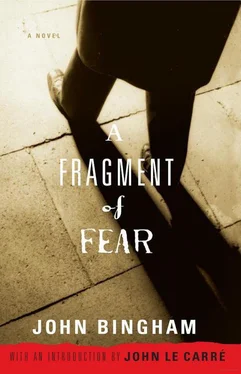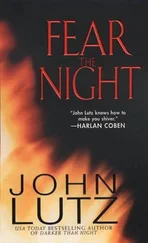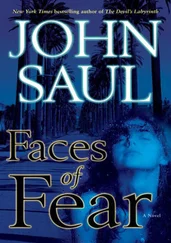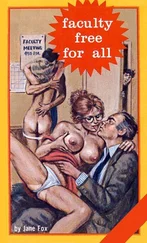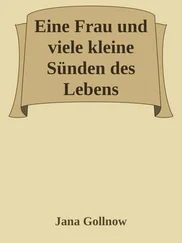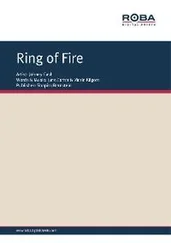John Bingham - A Fragment of Fear
Здесь есть возможность читать онлайн «John Bingham - A Fragment of Fear» весь текст электронной книги совершенно бесплатно (целиком полную версию без сокращений). В некоторых случаях можно слушать аудио, скачать через торрент в формате fb2 и присутствует краткое содержание. Жанр: Триллер, на английском языке. Описание произведения, (предисловие) а так же отзывы посетителей доступны на портале библиотеки ЛибКат.
- Название:A Fragment of Fear
- Автор:
- Жанр:
- Год:неизвестен
- ISBN:нет данных
- Рейтинг книги:3 / 5. Голосов: 1
-
Избранное:Добавить в избранное
- Отзывы:
-
Ваша оценка:
- 60
- 1
- 2
- 3
- 4
- 5
A Fragment of Fear: краткое содержание, описание и аннотация
Предлагаем к чтению аннотацию, описание, краткое содержание или предисловие (зависит от того, что написал сам автор книги «A Fragment of Fear»). Если вы не нашли необходимую информацию о книге — напишите в комментариях, мы постараемся отыскать её.
A Fragment of Fear — читать онлайн бесплатно полную книгу (весь текст) целиком
Ниже представлен текст книги, разбитый по страницам. Система сохранения места последней прочитанной страницы, позволяет с удобством читать онлайн бесплатно книгу «A Fragment of Fear», без необходимости каждый раз заново искать на чём Вы остановились. Поставьте закладку, и сможете в любой момент перейти на страницу, на которой закончили чтение.
Интервал:
Закладка:
But there was no response. At both ends of the mews I saw a small crowd being kept back by uniformed police.
The police waited five minutes without saying or doing anything. This is sound psychologically. It gives time for feelings of defiance to cool off.
At the end of that time they repeated the instructions, very slowly, adding, “You have sixty seconds to obey this order.”
But while the loud-hailer was still booming, and without the use of tear-gas or smoke, two officers were edging along close to the wall, guns in hands, until they reached the door. Here they paused and were joined by two more, one carrying an axe.
I watched the big axe rise and fall once on the wood around the lock and heard the crash as the shoulders of two fourteen-stone Special Branch officers completed the job, and I saw them disappear inside and waited for the sound of shots and shouts. None came. Nothing seemed to happen in the house.
But something happened outside the house all right. Two police officers rushed the van a few moments after the others had rushed the house. One of them, as I rose to my feet, bending low because of the van roof, flung himself at my legs in a football tackle, bringing me crashing to the floor. He was taking no chances.
“God Almighty, are you daft? Have you gone off your rocker?” I shouted.
“Probably,” he said. “Come on, hop out, there’s a good chap.”
“What the hell have I done?”
“You’re being detained on suspicion of passing information of possible use to a potential enemy, contrary to the Official Secrets Acts-something like that; come on, get cracking.”
I saw him pick up the envelope containing the document I had prepared for Ricketts. Somebody must have brought it into the green van. Maybe Brown-Eyes Matthews. If so, it was the last thing he carried. Later I saw his body being borne to an ambulance. He hadn’t been shot by police bullets as he tried to get into the house. He had been shot in the chest from inside the closing door. A man who might talk too much, on his own, inside Britain, and be an encumbrance outside Britain. Expendable, and better dead. Meanwhile, Ricketts and Leather-Jacket and Sallow-Face had vanished.
I thought something was wrong when a man I later knew as Chief Inspector Hope came out of the house alone. He looked grim.
I saw him run to the two police cars, and immediately their engines started and they roared off, sirens sounding, braying like castrated donkeys. The uniformed police at one end of the mews pushed the crowd back to let them race through and round the corner to the main road, tyres screeching.
House No. 25 had no rear exit. It backed on to another house. It could not be surrounded in the real sense of the word. No. 26 was the same. But No. 27 had a back door leading to an alley. Ricketts had a five-year lease on all three, through an innocent nominee who had sub-let the houses to him. Two roughly made communicating doors, for just such an emergency, connected the three houses. The birds had flown through the alley. All except the dead pigeon.
There are many little private landing places in Britain from which a small aeroplane can take off, and others on the Continent where it can land. Chief Inspector Hope did not bother to alert Interpol. He didn’t need to. He knew exactly where Ricketts was heading, and the time and place of his rendezvous in forty-eight hours’ time.
He telephoned the Naples police, and booked two seats on a Comet, one for himself and one for an Italian-speaking sergeant on his staff.
I offered to go if the police would pay my fare, on the feeble excuse that I might help in identifying people, but it wouldn’t wash. He said he’d had them under observation long enough for his purposes. The police are a bit mean about spending public money.
But I heard what happened, of course, and I can just imagine old muffin-faced Mrs. Caroline Gray stumping up from the little railway station, fighting off guides, through the gloomy Porta Marina of Pompeii, along the Via Marina, then turning left, past the Forum, along by the Insula Occidentalis and out by the Porta Ercolano to the Way of the Tombs. Shortly, turning left, then right, she would have been almost there, at the House of the Mysteries.
A long walk for an elderly woman, short, bandy-legged, and solidly built, fattened on Bower Hotel food. Ricketts could have directed her by a shorter route, but as her mission was to retrieve a certain address book from Bardoni’s hotel, I think he chose the longer route because it led her past House No. 27, in Section 12, where Mrs. Dawson had died. A kind of reminder to her not to have second thoughts.
The Way of the Tombs also made her pensive. She saw the great monumental mausoleum of the family Istacides, with a round colonnade on top, the marble tomb of Munatius Faustus with its bas-relief of a tempest-tossed ship and struggling crew, the semicircular exedra of Mamia Publius, a priestess of the people, on land voted for the purpose by the Senate, and the imposing last resting places of Marcus Porcius, and of Aulus Umbricius Scaurus, magistrate and merchant, to whom the Senate had not only voted land for the monument, but 200 sesterces for funeral money, and an equestrian statue in the Forum. All these honours are engraved on the sepulchre. An important man, Scaurus. She saw these and many other tombs.
The early Romans took the ashes of their dead to places outside the city and built their monuments, often with seats for visitors or passers-by, near to roads which would be thronged with travellers. Here the lingering spirits of the dead could happily listen to the chit-chat of the living. A nice thought, but Mrs. Caroline Gray was not in the mood for chit-chat, either with the living or the dead.
The main reason for this was the fact that she had not brought the address book with her.
I like to think of her standing in the initiation chamber where the Dionysiac mysteries were enacted, gazing around at the fresco with its life-size female figures which give some clue to the nature of the initiation ceremony.
Dumpy, beady-eyed, incongruous in such surroundings, she was alone, for it was late in the day. I can confirm, as can most others who have been there, that this room exudes an atmosphere of age-old occultism which is by no means due to the fresco with its portrayal of the ceremony, its Mistress in charge, its masks of Bacchus and Ariadne, its flagellation, and frenzied dance by the nude girl initiate.
She had about five minutes to decide whether she would like to have been an initiate herself. Then she heard footsteps and turned and saw Leather-Jacket and Sallow-Face.
Whether Ricketts was suspicious, whether he had noted that there were rather more so-called guards than usual around the House of the Mysteries, it is not now possible to say. He remained by the exit; till his bodyguard, perhaps, had tested the ground.
When the Italian police closed in on Mrs. Gray and the other two, he turned and ran for it, doubtless because in Italy he did not have the same diplomatic privilege as in England.
The Italian police did not use their guns until, in the Way of the Tombs, he began to use his.
He fell and died by the tomb of Aulus Veius, a magistrate, appropriately enough.
It is always hard for a writer to rehabilitate a villain, or a person he has regarded as a villain, even a minor one. One has lived with the villain, one has set ideas about the villain, one is loath to discard them.
But facts are facts, and facts from Chief Inspector Hope cannot be ignored.
I am bound therefore to record that Mrs. Caroline Gray, now living quietly once more at the Bower Hotel, was not a money-grabbing traitor. I must state, though reluctantly, that she knew nothing of Mrs. Dawson’s activities, and that the tip-off came first from a terrified Bardoni to the Italian police, who passed it on to England.
Читать дальшеИнтервал:
Закладка:
Похожие книги на «A Fragment of Fear»
Представляем Вашему вниманию похожие книги на «A Fragment of Fear» списком для выбора. Мы отобрали схожую по названию и смыслу литературу в надежде предоставить читателям больше вариантов отыскать новые, интересные, ещё непрочитанные произведения.
Обсуждение, отзывы о книге «A Fragment of Fear» и просто собственные мнения читателей. Оставьте ваши комментарии, напишите, что Вы думаете о произведении, его смысле или главных героях. Укажите что конкретно понравилось, а что нет, и почему Вы так считаете.
